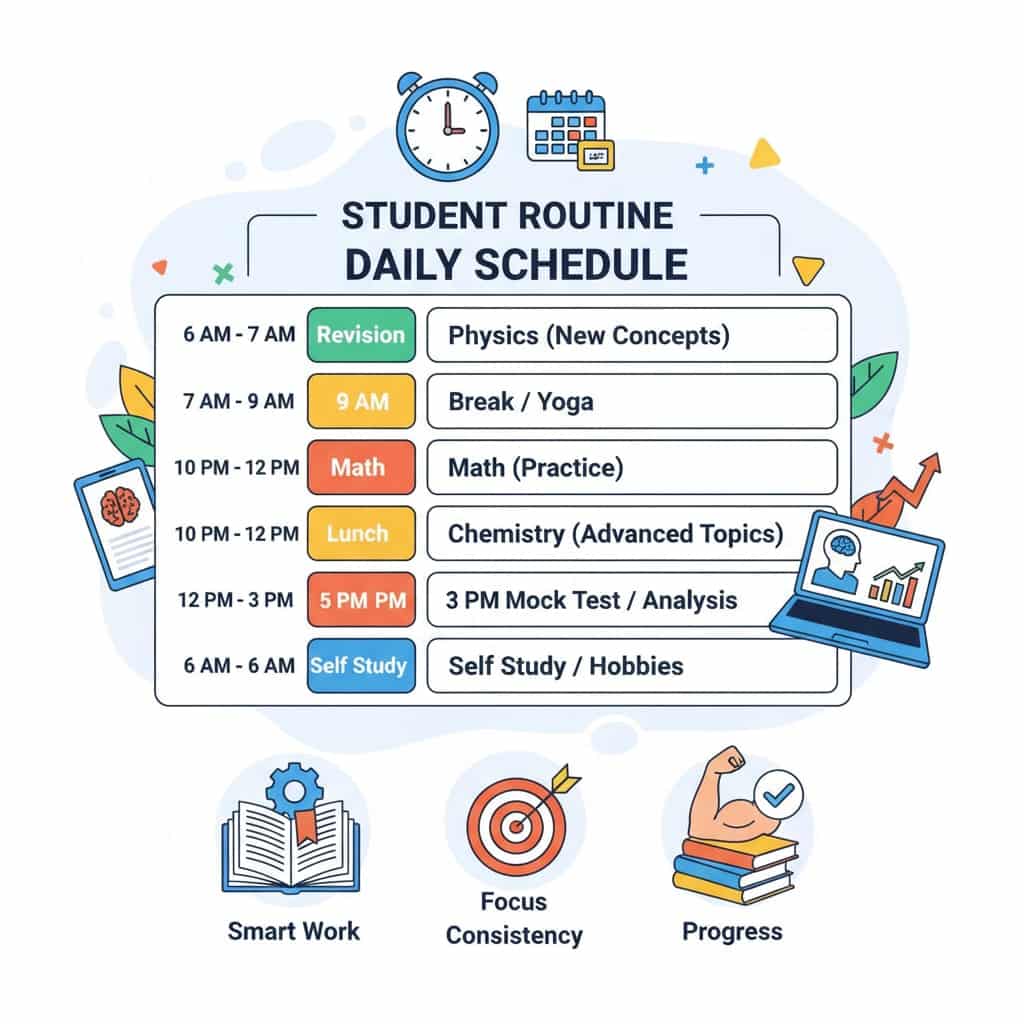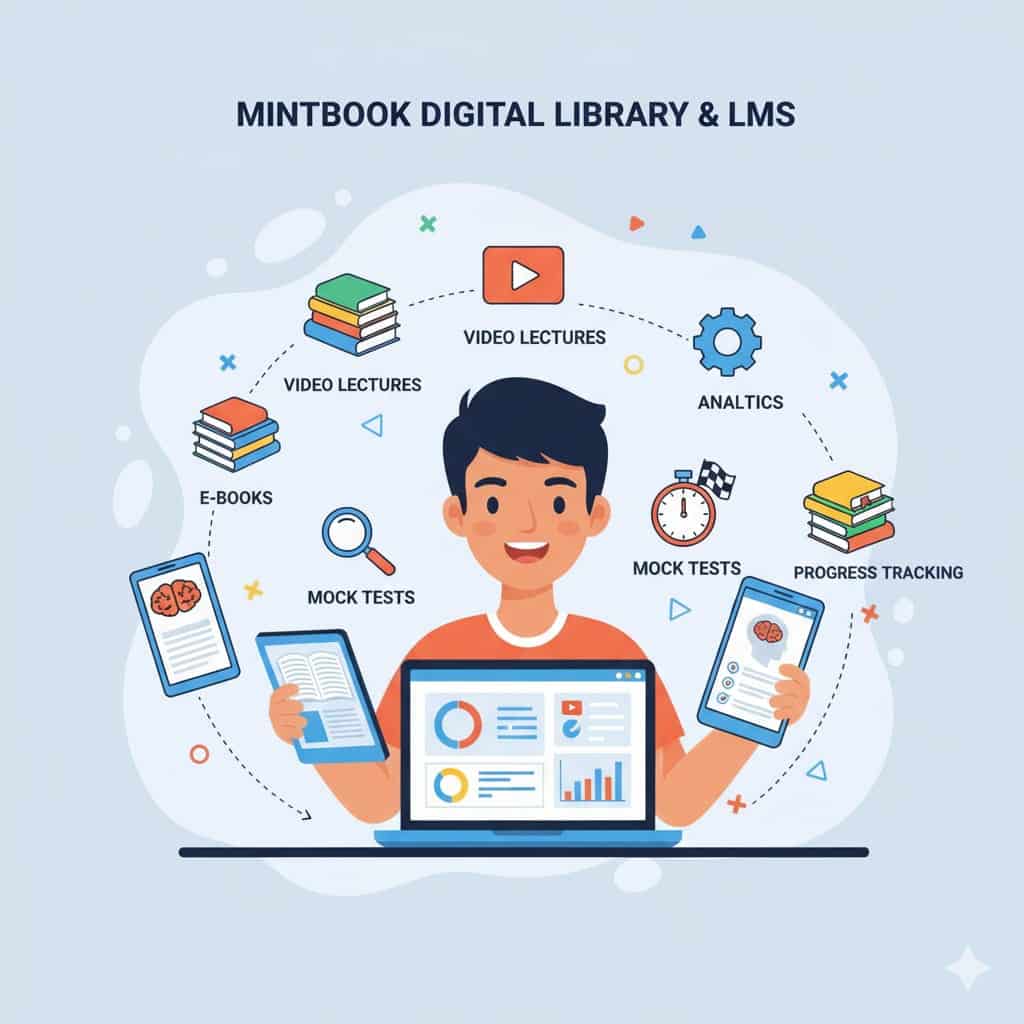Introduction: Why JEE is One of the Toughest Exams in India
The Joint Entrance Exam (JEE) is a very critical gateway to the top Indian engineering schools (IITs, NITs, and IIITs). It is very difficult because of its high competition and volume of syllabus, which involves rigorous knowledge in Physics, Chemistry, and Mathematics. Only proper planning, study habits, and resource use, which are facilitated by the affective attitude and digital learning tools, will help in succeeding in JEE.
Section 1: JEE Main vs Advanced – Syllabus and Pattern
It is important to know what will make JEE Main and JEE Advanced different before one gets down to preparation.
The first step is the JEE Main, which is administered by the National Testing Agency (NTA). It is the admission screening test of NITs, IIITs, and other centrally funded institutions- and also the eligibility for JEE Advanced.
- Mode: Computer-based
- Subjects: Mathematics, Physics,
- Total Marks: 300
- Type of question: MCQs and numerical value questions that are mostly application-based.
JEE Advanced, on its part, is taken by the IITs and uses the level to test the candidate to use the concepts at a very advanced level.
- Mode: Computer-based, two
- Type of Question: Multiple correct, numerical questions, comprehension
- Challenge: Conceptual, analytical, and logical reasoning
Although the two examinations have a similar syllabus, JEE Advanced is a test that demands clarity in the concepts, multi-step problem-solving, and logical combination of various subjects. This difference can be used to smartly prepare students to choose between speed and precision in JEE Main and depth in concepts in JEE Advanced..
Section 2: Major Problems of Students
With the best intentions in place, not all aspirants manage to keep up. These are the most widespread difficulties they have:
- Huge Syllabus & Time Limitations:
The JEE curriculum intersects with Class 11 and 12, but goes deeper into the concept. Balancing school studies and JEE preparation easily overpowers students.
- Lack of Conceptual Clarity:
A high number of students are oriented toward memorization rather than grasping the reasoning behind formulas. This strategy does not work particularly in the JEE Advanced, where analytical thinking is examined.
- Stress & Burnout:
Fatigue, anxiety, and demotivation may result due to stress in terms of long study hours, extreme competitiveness, and expectation pressure.
- Lack of a proper Study Plan:
Lacking a planned arrangement or regular review, students find themselves underprepared despite months of hard work.
- Lack of Suitable Availability of Good Resources:
One of the biggest challenges is to get original study materials, papers from previous years, and sound mock tests, particularly for students in smaller towns.
Intelligent planning and the use of technology-based learning platforms are the key to overcoming these challenges..
Section 3: Smart Preparation Strategy for JEE Success
To prepare effectively, students need a blend of discipline, consistency, and digital support. Here’s a step-by-step smart study plan to guide aspirants:
- Plan a Realistic Daily Routine
- Divide your day strategically:
- 6–7 hours of focused study
- 2–3 hours for school/tuition
- 1 hour for revision
- Take short breaks every 90 minutes to refresh
Problem-solving can be done in the morning hours, when the mind is most active, and evenings, when the concepts can be revised or video lectures.
- Give Emphasis on Conceptual Learning as opposed to
Emphasize knowing the reason behind each formula. Enhance the basics, particularly in subjects such as mechanics, organic reactions, and calculus, through the use of visual explanations, simulation videos, and concept-based e-books.
- Make the best use of Past Year Papers (PYQs).
PYQs allow practicing patterns and familiarize oneself with the difficulty of exams. Break down every paper to know which areas you are weak in and change your study strategy.
- Attempt Regular Mock Tests
A full-length mock test every 10-15 days. This can be used to simulate the conditions of a real exam, better time management, and accuracy. The analysis of the test is no more significant than the test itself- find out what you lost marks on and repeat.

- Revise Systematically
Allot one day in a week to revision. Write brief notes on formulas, significant theorems, and reaction mechanisms. Recall through the use of digital flashcards or web-based quizzes.
- Keep the Body and Mind in
Focus requires good sleep, hydration, and exercise on a daily basis. A peaceful and sound mind works far better in high-pressure exams such as JEE.
Section 4: How Digital Libraries Empower JEE Preparation
In today’s digital-first education ecosystem, a Digital Library can completely transform how students prepare for competitive exams like JEE.
Platforms like Mintbook’s Digital Library provide 24/7 access to:
- E-books from trusted publishers
- Previous year question papers
- Topic-wise question banks
- Simulations and interactive video
Wasting time by browsing in search of materials can be replaced by finding instantly reliable and filtered materials in one place. Online searchable material is more efficient in time, clarity of the concept, and self-directed learning is painless.
Furthermore, as everything is available on laptops, tablets, and mobile devices, students can always keep on learning everywhere, at all times, with or without the use of the internet, whether in offline mode or online.
Aspirants will be able to practice, update, and study more advanced issues on Mintbook because of its enormous content base, transforming difficulties into opportunities.

Section 5: Adding Structure in Learning Management Systems (LMS).
A digital library provides content, whereas an LMS (Learning Management System) introduces direction and organization to the learning process.
The built-in LMS at Mintbook guarantees:
- Individual Study Plans: Dependent on the progress and mastery of the
- Performance Tracking: Strengths and weaknesses based on
- Automated Assessments: instant result self-tests, quizzes, and mock
- Collaborative Learning: Availability of discussion groups, study groups, and common notes.
The combination of a digital library + LMS allows students to move beyond random studying. It ensures organized, measurable progress, making preparation data-driven and efficient.
Conclusion: Mintbook – Your Smart Study Companion for JEE Success
Mintbook enhances JEE preparation by combining structured learning, technology aids, and systematic practice. It provides integrated study material, test series, progress measurement, and expert-sourced e-content, maximizing effort and improving efficiency for candidates.
No matter if you are targeting JEE Main or Advanced, have Mintbook as your go-to study guide—enable yourself to study smarter, prepare harder, and realize your dream of becoming an IITian.

